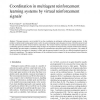1047 search results - page 29 / 210 » Learning the required number of agents for complex tasks |
TNN
2010
13 years 2 months ago
2010
Abstract--Recently, sparse approximation has become a preferred method for learning large scale kernel machines. This technique attempts to represent the solution with only a subse...
AIED
2007
Springer
14 years 1 months ago
2007
Springer
We have developed environments that use teaching as a metacognitive, reflective, and iterative process to help middle school students learn about complex processes. We demonstrate ...
KES
2004
Springer
14 years 1 months ago
2004
Springer
This paper presents a novel method for on-line coordination in multiagent reinforcement learning systems. In this method a reinforcement-learning agent learns to select its action ...
COLT
2000
Springer
14 years 1 days ago
2000
Springer
We investigate the computational complexity of the task of detecting dense regions of an unknown distribution from un-labeled samples of this distribution. We introduce a formal l...
MA
1999
Springer
13 years 12 months ago
1999
Springer
In order to maintain their performance in a dynamic environment, agents may be required to modify their learning behavior during run-time. If an agent utilizes a rule-based system...

